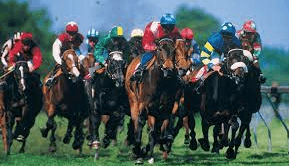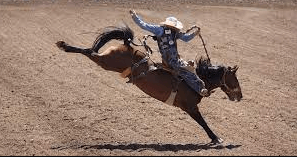How Can A Jockey Influence The Result Of A Horse Race?

Horse racing is an exhilarating sport that captivates audiences around the world. While the horses themselves are undoubtedly key players in determining the outcome of a race, it is often overlooked how much influence jockeys have on the final result. Jockeys play a crucial role in strategic positioning throughout the race, making decisions and tactical moves that can significantly impact the outcome.
In this article, we will explore how jockeys use their expertise to shape the course of a horse race and ultimately influence its result.
One way in which jockeys exert their influence is through strategic positioning throughout the race. Before a race even begins, jockeys carefully analyze factors such as track conditions, competition, and their own horse’s strengths and weaknesses. Armed with this knowledge, they strategically position their horse during different stages of the race to give them the best chance at success.
Whether it be by guiding their horse to take an advantageous inside position or keeping them out of trouble by avoiding congestion, jockeys constantly assess and adjust their positions to gain any possible advantage over their rivals.
In addition to strategic positioning, jockeys also make critical decision-making and tactical moves during a race that can greatly affect its outcome. They must possess a deep understanding of each individual horse’s abilities and temperament to know when to push for more speed or when to conserve energy for later stages of the race.
Moreover, jockeys must anticipate potential challenges or opportunities that may arise during a race, such as sudden shifts in pace or unexpected obstacles on the track. Their ability to make split-second decisions based on these circumstances can be instrumental in determining whether they finish first or fall behind.
In conclusion, jockeys hold immense power in shaping the result of a horse race through strategic positioning and decision-making during a race. Their expertise allows them to make informed choices that maximize their chances for success while navigating both predictable and unpredictable elements of the race.
As spectators, we can appreciate the skill and experience that jockeys bring to the sport, knowing that their influence plays a significant role in the freedom of competition on the racetrack.
Strategic Positioning Throughout the Race
Strategic positioning throughout the race enables a jockey to optimize their horse’s chances of success by strategically maneuvering and adapting to the changing dynamics of the racecourse.
Effective race tactics and strategy play a crucial role in determining the outcome of a horse race.
Jockeys must carefully consider factors such as track conditions, distance, and competition when deciding where to position their horse during different stages of the race.
By analyzing these variables, experienced jockeys can make informed decisions on when to push their horse forward or hold back, ensuring that they are in the most advantageous position at key moments.
This strategic approach allows jockeys to exploit any weaknesses in their opponents’ performance while capitalizing on their own horse’s strengths.
Additionally, skilled jockeys have the ability to adapt their positioning strategies as needed throughout the race, responding to unexpected developments or changes in pace.
Overall, strategic positioning is an essential aspect of a jockey’s role in influencing the result of a horse race and plays a significant role in maximizing their chances for success.
Decision-Making and Tactical Moves
Tactical maneuvers made during a competitive equestrian event have the potential to shape outcomes and create advantageous circumstances.
In horse racing, decision-making and race tactics play a crucial role in determining the success of a jockey and their mount. When it comes to decision making, experienced jockeys assess various factors such as track conditions, weather, distance, and competition before formulating their strategy for the race. They carefully analyze the strengths and weaknesses of their horse as well as those of other contenders to determine the best approach.
During the race itself, jockeys make tactical moves that can significantly impact the outcome. This includes positioning their horse strategically to take advantage of gaps in the field or finding optimal running lines that minimize energy expenditure. Additionally, jockeys must decide when to push their horses for maximum speed or conserve energy for critical moments later in the race.
By employing these calculated decisions and strategic moves, jockeys aim to gain an edge over their competitors and increase their chances of achieving victory on behalf of both themselves and their mounts.
Impact on the Outcome of the Race
In the context of horse racing, jockeys possess a unique ability to influence the performance of their horses. Through their knowledge and experience, jockeys can make tactical moves during a race that maximize the chances of success for their horses.
Their role in determining the winner cannot be underestimated, as their decisions on when to accelerate or conserve energy can significantly impact the outcome of the race.
Influencing the Performance of the Horse
To optimize the horse’s performance, a jockey can employ various techniques that enhance the horse’s physical capabilities and overall racing abilities.
Through strategic race tactics and effective horse management, a jockey can greatly influence the performance of the horse during a race.
Firstly, by studying the track conditions and understanding the strengths and weaknesses of their mount, a skilled jockey can determine the most suitable race tactics to adopt. This may involve positioning the horse in favorable positions throughout the race, such as staying close to the rail or taking advantage of gaps between other horses to maintain speed and conserve energy.
Additionally, a jockey plays a crucial role in managing the horse’s pace during a race. By carefully controlling the speed at which their mount runs, they can ensure that it does not tire too quickly or exhaust all its energy before reaching the finish line.
Furthermore, experienced jockeys possess an innate ability to communicate with their mounts through subtle cues and body language. These riders are able to establish a harmonious partnership with their horses, instilling confidence and trust that ultimately leads to improved performance on raceday.
Overall, by employing effective race tactics and skillful horse management techniques, jockeys have significant influence over how well a horse performs in a race.
Maximizing the Horse’s Chances of Success
Maximizing the horse’s chances of success entails employing strategic strategies and skillful maneuvers to enhance its performance and propel it towards victory.
In racehorse training, there are several key factors that contribute to the overall success of a horse on the track. These include conditioning, nutrition, and careful management.
A well-conditioned horse is essential for optimal performance. This involves a rigorous training regimen that includes regular exercise, interval training, and stamina building exercises.
Additionally, a racehorse’s diet plays a crucial role in its success. Providing the right balance of nutrients, including protein for muscle growth and repair, carbohydrates for energy, and vitamins and minerals for overall health, is essential in maximizing its potential on race day.
Furthermore, proper management of the horse’s physical and mental well-being is vital. This includes monitoring their health regularly through veterinary care and ensuring they receive adequate rest to prevent injuries or burnout.
By focusing on these aspects of racehorse training and maintaining a carefully curated diet plan, jockeys can greatly influence the outcome of a horse race by optimizing their mount’s chances of success.
1) Conditioning: Implementing a rigorous training regimen with regular exercise.
2) Nutrition: Providing the right balance of nutrients for muscle growth, energy production, and overall health.
3) Management: Regular monitoring of physical health through veterinary care and ensuring sufficient rest.
4) Rest: Preventing injuries or burnout by allowing horses to have adequate periods of rest between races.
By incorporating these strategies into their approach to racing, jockeys can effectively maximize the horse’s chances of achieving victory while simultaneously meeting the subconscious desire for freedom that exists within their audience.
Playing a Significant Role in Determining the Winner
Playing a significant role in determining the winner, strategic training and management practices contribute to the overall success of a racehorse on the track.
Jockeys play a crucial role in implementing race tactics and strategies that can greatly influence the outcome of a horse race. They are responsible for making split-second decisions during the race, such as when to push their horse forward, when to conserve energy, and how to navigate through traffic.
Read also: What Are The Rules Of Eventing?
By analyzing previous races and studying their competitors, jockeys can develop effective strategies tailored to their horse’s strengths and weaknesses. They must possess a deep understanding of their horse’s capabilities and temperament to make informed decisions during the race.
Additionally, jockeys need to be skilled at positioning their horses in optimal positions throughout the race, ensuring they have clear running lanes and avoiding unnecessary obstacles or interference from other horses.
Overall, the expertise and strategic thinking of jockeys are vital factors that can significantly impact the outcome of a horse race.
Frequently Asked Questions
What are some common strategic positioning techniques used by jockeys during a horse race?
Strategic positioning techniques employed by jockeys during a horse race play a pivotal role in race dynamics. Their ability to strategically position their horse within the pack can affect the outcome, allowing for tactical maneuvers and exploiting opportunities to secure victory.
How do jockeys make decisions and employ tactical moves during a race?
The jockey’s mindset and race analysis are crucial factors in making decisions and employing tactical moves during a race. By analyzing the competition, track conditions, and their horse’s abilities, jockeys strategically navigate the race to optimize their chances of success.
Can a jockey’s decision-making and tactical moves significantly impact the outcome of a race?
A jockey’s decision-making and tactical maneuvers can significantly impact the outcome of a race. By carefully analyzing race dynamics, experienced jockeys can employ strategic moves that maximize their horse’s chances of winning, thus influencing the final result.
What are some factors that can influence the outcome of a race and how does a jockey contribute to it?
Factors influencing race outcomes include horse ability, track conditions, and race distance. A jockey’s role in race dynamics is crucial as they strategically position the horse, assess competition, and make tactical decisions to maximize the horse’s performance and chances of winning.
Are there any specific race scenarios where the jockey’s influence on the outcome is more pronounced?
In specific race conditions, the jockey’s riding style can have a more pronounced influence on the outcome. Their expertise and strategic decision-making can be likened to an orchestra conductor, shaping the race with precise movements and calculated maneuvers.
Conclusion
In conclusion, the influence of a jockey in a horse race is undeniable. Through strategic positioning and decision-making, they can significantly impact the outcome of the race.
By carefully assessing the competition and making tactical moves, jockeys can create opportunities for their horses to excel. The adage ‘fortune favors the bold’aptly captures the essence of their role in racing.
Throughout history, jockeys have understood that success requires more than just riding skillfully. They must possess a deep understanding of their horse’s abilities and temperament, as well as an astute awareness of their competitors’ strategies.
This knowledge allows them to strategically position themselves throughout the race, ensuring that they are in favorable positions to make crucial moves when necessary.
Moreover, decision-making plays a vital role in determining the fate of a race. Jockeys must make split-second judgments on when to conserve energy or make a decisive move towards victory. Their ability to analyze and assess each situation accurately is paramount in achieving optimal results.
Ultimately, it is this combination of strategic positioning and intelligent decision-making that enables jockeys to influence the result of a horse race. By applying their experience and expertise, they can navigate through challenging circumstances and seize opportunities for triumph.
As spectators marvel at these skilled riders guiding their equine partners towards glory, they recognize that indeed, fortune does favor those who dare to take calculated risks on the racetrack.



